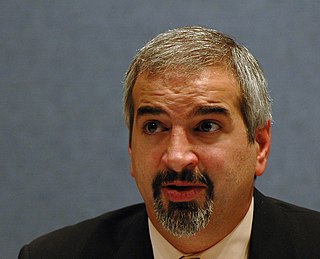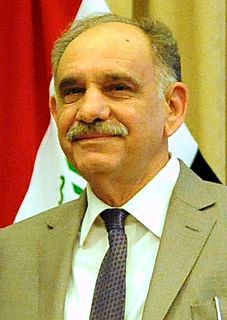A Quote by Oliver North
What's been happening in Iraq, what young Americans wearing flak jackets, helmets and flight suits have done is... created the circumstances under which Iraq can become our closest ally in that part of the world and still have a representative government. And that's going to be a very good thing considering what's going on in that neighborhood.
Related Quotes
I am very optimistic about - about Iraq. I mean, this could be one of the great achievements of this administration. You're going to see 90,000 American troops come marching home by the end of the summer. You're going to see a stable government in Iraq that is actually moving toward a representative government.
It's harder to end a war than begin one. Indeed, everything that American troops have done in Iraq -- all the fighting and all the dying, the bleeding and the building, and the training and the partnering -- all of it has led to this moment of success. Now, Iraq is not a perfect place. It has many challenges ahead. But we're leaving behind a sovereign, stable and self-reliant Iraq, with a representative government that was elected by its people. We're building a new partnership between our nations.
What matters is that in this Iraq campaign that we clarify the different points of view. And there are a lot of people in the Democratic Party who believe that the best course of action is to leave Iraq before the job is done. Period. And they're wrong. And the American people have got to understand the consequence of leaving Iraq before the job is done. We're not going to leave Iraq before the job is done and we'll complete the mission in Iraq.
I was in Iraq in the worst period, 2006, but from 2006 to 2008, and especially through 2011, the American military and the government of Iraq made huge strides in making that country a source of stability with a relatively representative government that was seeking pluralistic engagement from all the factions within the government.
Continuous wars - which we have now had since 2001 - starting with Afghanistan, continuing on to Iraq. And even since Iraq, it's been more or less continuous. The appalling war in Libya, which has wrecked that country and wrecked that part of the world, and which isn't over by any means. The indirect Western intervention in Syria, which has created new monsters. These are policies, which if carried out by any individual government, would be considered extremist. Now, they're being carried out collectively by the United States, backed by some of the countries of the European Union.
Iraq at one time was actually a functioning government. It's a real state. Afghanistan is not Iraq. It's tribal. It's got a different - a number of different sects, never really had a solid government there running the country on any kind of a continuing basis. Well, to rebuild the nation of Afghanistan is going to be more difficult than rebuilding the nation of Iraq.
I opposed the war in Iraq because I did not believe it was in our national security interest, and I still don't. What we [America] did was akin to taking a baseball bat to a beehive. Our primary security threat right now is terrorism - and by doing what we did in Iraq, we've managed to alienate a good part of the world and most of the allies whose intelligence and other help we need to combat and defeat terrorism.
There was this very deliberate move to just overlay an American reality in Iraq. I've never actually seen the map, but apparently Americans thought the names of places were just too complicated so they got decent maps of Baghdad and just renamed everything with familiar names. This neighborhood would be Hollywood, that neighborhood would be Manhattan, and that one's Madison, you're going to drive down Oak and take a left on Main Street.
What is the value of having millions of people in Iraq not having a repressive regime? What is the value of having the Iraqi regime not shooting at UK and US aircraft almost every day? What is the value of the Iraqis having a free press? What is the value of the foreign minister of Iraq going to Paris, calling for an end of the Gadhafi regime and citing Iraq as a model, as an example, that in fact a freer political system can exist in that part of the world?





































